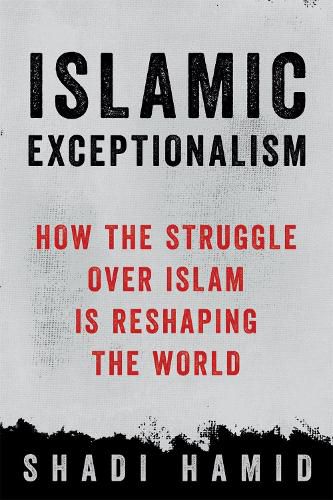Readings Newsletter
Become a Readings Member to make your shopping experience even easier.
Sign in or sign up for free!
You’re not far away from qualifying for FREE standard shipping within Australia
You’ve qualified for FREE standard shipping within Australia
The cart is loading…






In Islamic Exceptionalism, Brookings Institution scholar and acclaimed author Shadi Hamid offers a novel and provocative argument on how Islam is, in fact, exceptional in how it relates to politics, with profound implications for how we understand the future of the Middle East. Divides among citizens aren’t just about power but are products of fundamental disagreements over the very nature and purpose of the modern nation state-and the vexing problem of religion’s role in public life. Hamid argues for a new understanding of how Islam and Islamism shape politics by examining different models of reckoning with the problem of religion and state, including the terrifying-and alarmingly successful-example of ISIS.
With unprecedented access to Islamist activists and leaders across the region, Hamid offers a panoramic and ambitious interpretation of the region’s descent into violence. Islamic Exceptionalism is a vital contribution to our understanding of Islam’s past and present, and its outsized role in modern politics. We don’t have to like it, but we have to understand it-because Islam, as a religion and as an idea, will continue to be a force that shapes not just the region, but the West as well in the decades to come.
$9.00 standard shipping within Australia
FREE standard shipping within Australia for orders over $100.00
Express & International shipping calculated at checkout
In Islamic Exceptionalism, Brookings Institution scholar and acclaimed author Shadi Hamid offers a novel and provocative argument on how Islam is, in fact, exceptional in how it relates to politics, with profound implications for how we understand the future of the Middle East. Divides among citizens aren’t just about power but are products of fundamental disagreements over the very nature and purpose of the modern nation state-and the vexing problem of religion’s role in public life. Hamid argues for a new understanding of how Islam and Islamism shape politics by examining different models of reckoning with the problem of religion and state, including the terrifying-and alarmingly successful-example of ISIS.
With unprecedented access to Islamist activists and leaders across the region, Hamid offers a panoramic and ambitious interpretation of the region’s descent into violence. Islamic Exceptionalism is a vital contribution to our understanding of Islam’s past and present, and its outsized role in modern politics. We don’t have to like it, but we have to understand it-because Islam, as a religion and as an idea, will continue to be a force that shapes not just the region, but the West as well in the decades to come.